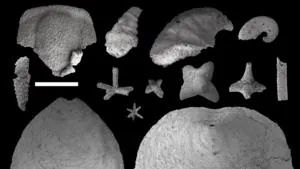
Unearthing Ocean's Secrets: Tiny Fossils Reveal Ancient Reef Mysteries
2025-06-12
Author: Mei
Discoveries from 514 Million Years Ago
Imagine a world over 514 million years ago, long before dinosaurs roamed the Earth. In the ancient seas, sponge-like creatures known as archaeocyathids were busy crafting some of the planet’s very first reefs. These fascinating organisms thrived just north of Death Valley, in what is now Nevada.
Revolutionary Insights into Early Marine Life
Recent research from the University of Missouri has delved into how these primordial reef-builders shaped their underwater environment. The study also examined minuscule fossilized sea creatures known as "small shelly fauna," recognized as some of the earliest animals with hard shells discovered on our planet.
Biodiversity Revelations
While modern coral reefs are celebrated as biodiversity hotspots, teeming with life, the findings suggest that ancient reefs did not enhance biodiversity in a similar manner. Casey Bennett, the study's lead author and a graduate student at the Department of Geological Sciences, notes, "In contemporary reefs, biodiversity decreases as one moves away due to limited shelter and food access. However, we found no consistent patterns with ancient reefs—variations were largely attributed to localized conditions."
Revolutionary Understanding of Earth's Ecosystems
This groundbreaking research sheds light on the evolution of marine life and challenges long-standing assumptions about the development of ecosystems surrounding reef structures. It serves as a vital reminder that not all reefs are equal, and understanding their ancient forms may provide crucial insights into the future of modern marine systems.
Ancient Currents and Rock Layers
The research team meticulously analyzed diverse fossil assemblages across various rock sections, revealing a community that, while low in diversity, was high in abundance. Certain organisms seemed to dominate specific layers, potentially influenced by ancient ocean currents. Co-author Sarah Jacquet, a paleontology assistant professor at Mizzou, stresses the significance of hydrodynamics: "It seems that water movement played a key role in determining which organisms thrived."
The Importance of Specific Sediment Conditions
Moreover, the type of rock surrounding the reef significantly affected fossil preservation quality. Bennett elaborates, "Different rock types seemed to create varying ‘sub-environments’ that better preserved certain organisms, leading to localized clusters of specific fossils."
A Call for Continued Exploration
The research team emphasizes the necessity for ongoing fieldwork and fossil analysis to enhance our understanding of how ancient reef habitats influenced life in Earth’s oceans. Jacquet concludes, "Just because we understand today’s ecosystems doesn’t mean they functioned the same in the past. This research invites us to appreciate the remarkable evolution of life under radically different conditions."
 Brasil (PT)
Brasil (PT)
 Canada (EN)
Canada (EN)
 Chile (ES)
Chile (ES)
 Česko (CS)
Česko (CS)
 대한민국 (KO)
대한민국 (KO)
 España (ES)
España (ES)
 France (FR)
France (FR)
 Hong Kong (EN)
Hong Kong (EN)
 Italia (IT)
Italia (IT)
 日本 (JA)
日本 (JA)
 Magyarország (HU)
Magyarország (HU)
 Norge (NO)
Norge (NO)
 Polska (PL)
Polska (PL)
 Schweiz (DE)
Schweiz (DE)
 Singapore (EN)
Singapore (EN)
 Sverige (SV)
Sverige (SV)
 Suomi (FI)
Suomi (FI)
 Türkiye (TR)
Türkiye (TR)
 الإمارات العربية المتحدة (AR)
الإمارات العربية المتحدة (AR)